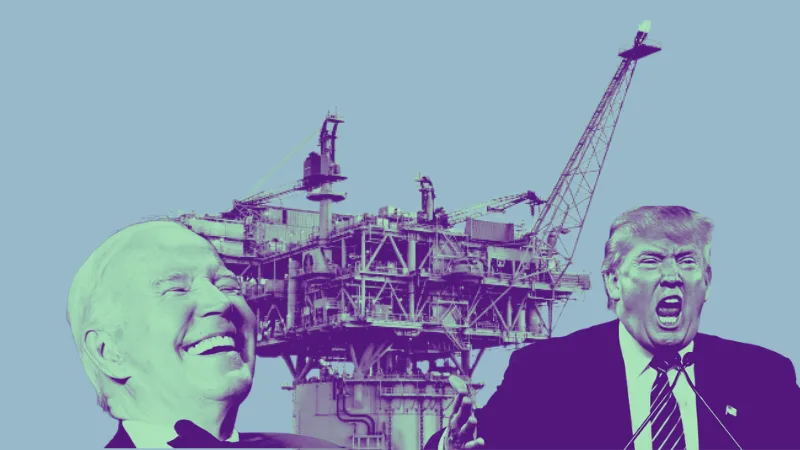President Joe Biden’s recent executive order halting new offshore oil and gas drilling across large swaths of U.S. coastal waters has set the stage for a significant policy clash with incoming President Donald Trump. Biden’s decision, framed as a critical step to address climate change and protect marine ecosystems, directly conflicts with Trump’s plans to expand domestic oil and gas production.
This article examines the scope of the ban, the challenges it presents to Trump’s energy agenda, and what it means for the U.S. economy, environment, and energy markets.
The Scope of Biden’s Drilling Ban
President Biden’s order blocks new oil and gas leases across more than 625 million acres of coastal waters, including the East Coast, Pacific Coast, and parts of Alaska’s Northern Bering Sea. These areas were previously considered for energy exploration under Trump’s administration, but Biden’s decision marks a sharp reversal.
Biden’s rationale centers on combating climate change and preserving vulnerable ecosystems. Proponents of the ban argue that expanding drilling in these areas poses risks of oil spills and contributes to greenhouse gas emissions. However, the central and western Gulf of Mexico, which accounts for a significant portion of U.S. oil production, remains unaffected by this ban.
Trump’s Energy Vision
Donald Trump’s campaign emphasized a return to an “America First” energy policy, prioritizing domestic production to reduce reliance on foreign oil and create jobs. Offshore drilling was a key component of this strategy, with Trump previously pushing to expand leases in federal waters, including areas now blocked by Biden’s order.
Trump’s administration argued that increased oil and gas production would bolster U.S. energy independence, drive economic growth, and strengthen geopolitical leverage. The drilling ban, however, complicates these plans and limits the potential for offshore energy expansion.
Challenges for Reversing the Ban
Reversing Biden’s drilling ban won’t be straightforward for President Trump. Executive orders can be rescinded, but doing so could spark legal challenges from environmental groups and regulatory delays. Additionally, Congress may need to weigh in on broader legislative actions to facilitate new leases, which could face opposition from Democrats and moderate Republicans.
Moreover, energy companies may be hesitant to invest in new offshore projects amid uncertainty about future regulatory changes, further slowing Trump’s ambitions.
Economic and Environmental Implications
Economic Impact: Biden’s ban could reduce opportunities for job creation in the oil and gas sector, particularly in states like Alaska and Louisiana that rely heavily on energy production. Industry groups, such as the American Petroleum Institute, argue that the decision undermines U.S. energy security and economic competitiveness.
However, supporters of the ban counter that it could accelerate investments in renewable energy and innovation, creating long-term economic opportunities in green industries.
Environmental Impact: The drilling ban aligns with global efforts to reduce carbon emissions and combat climate change. By protecting vulnerable marine ecosystems, the policy seeks to mitigate the risks of oil spills and preserve biodiversity. Critics, however, argue that the ban shifts production to countries with less stringent environmental regulations, potentially offsetting its intended benefits.
What This Means for Energy Markets
The ban could reduce future U.S. oil output, potentially leading to higher energy prices if domestic supply tightens. This scenario could benefit renewable energy companies and foreign oil producers, particularly in OPEC nations, as U.S. reliance on imports increases.
Regions dependent on offshore drilling, like the Gulf Coast, may face economic challenges if new lease opportunities diminish. Conversely, states prioritizing renewable energy could see growth as federal policies encourage green investments.
Reactions from Key Stakeholders
Environmental Groups: Environmental advocates have praised the ban as a landmark decision to protect marine ecosystems and combat climate change. Organizations like the Sierra Club have called it a “critical step toward a sustainable future.”
Industry Groups: The oil and gas industry has strongly opposed the ban, warning of job losses and economic disruption. The American Petroleum Institute criticized the decision as “politically driven” and “detrimental to energy security.”
Public Opinion: Public sentiment is divided, with many Americans supporting efforts to address climate change but also expressing concerns about economic impacts, particularly in energy-dependent communities.
The Debate Continues
President Biden’s drilling ban represents a significant shift in U.S. energy policy, prioritizing environmental goals over expanded oil and gas production. For President Trump, this decision poses a major obstacle to his energy agenda, requiring strategic action to navigate legal and political challenges.
As the debate over energy policy continues, the clash between environmental preservation and energy independence underscores the complexities of balancing economic growth with sustainability. Readers, what do you think? Should the U.S. prioritize environmental protection or expand domestic energy production? Share your thoughts below.





